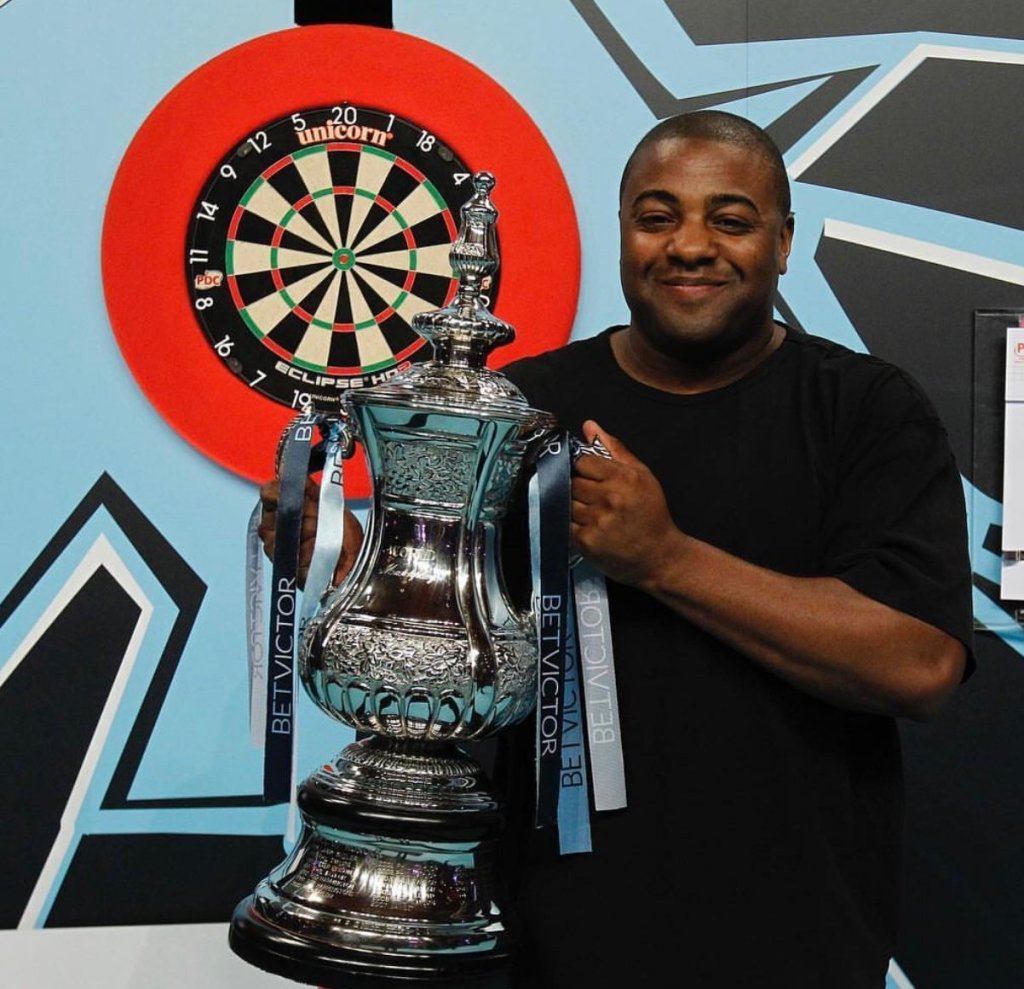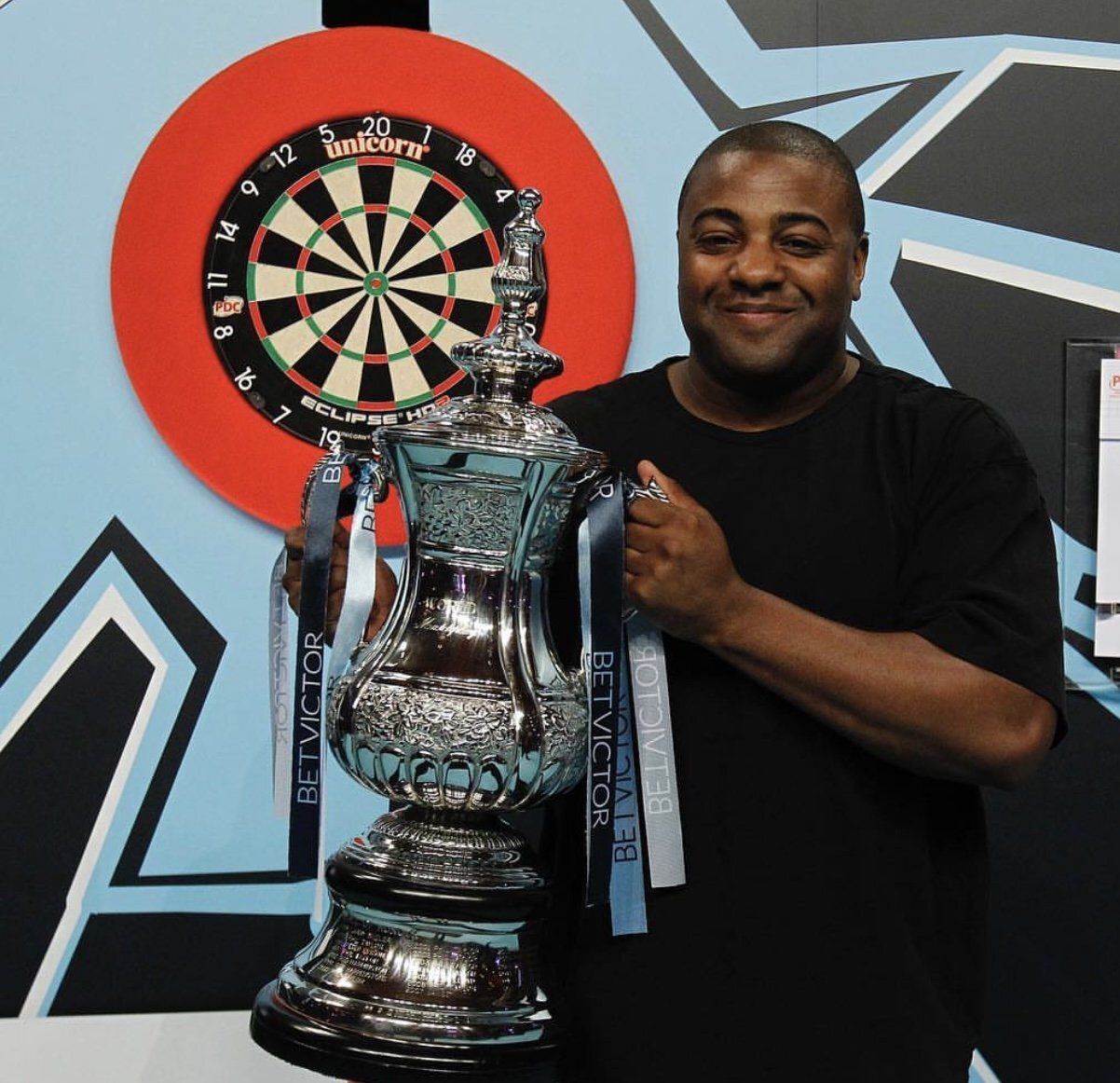Dr. Leon Davis is a Senior Lecturer in Tourism and Events Management at Teesside University and has researched and written about darts extensively in the last decade. I first came across Leon’s name when reading King Adz’s book Fear and Loathing on the Oche, and after some initial contact about eighteen months ago, spoke to him last week. It was just a few days after the PDC World Championship had begun and hours following one of sport’s biggest occasions: the FIFA World Cup final.
When not working day-to-day as a lecturer, Davis has spent a lot of time in recent years going to a number of PDC darts events, observing how the spectacle we have become accustomed to has been constructed.
However, darts was not initially Leon’s focus, as he explained. “I am a huge fan of all sports, but football has always been my favourite. My first research was focused on football fans (namely Manchester United fans) and particularly the typologies and categorisations of football fans in terms of home and away fandom.”
“When I was in the final stages of my Masters degree at Sheffield Hallam University, one of the assignments was to create a journal article. I wanted to focus on the way professional darts had changed over the last few decades. This was back in 2012: I was intrigued by the way things had moved on from the 1990s particularly and the switch from smaller venues to arenas.”
Davis continued: “In 2015, I tried to revive the article and so I got in touch with Dave Allen, the Head of Media at the PDC. He invited me to visit a PDC Premier League event at Sheffield Arena and the access they provided me was fantastic. I cannot speak highly enough about the PDC staff. The access was something I could never have got with a professional football club or governing body, so it made things so much easier for me as far as time is concerned especially as I am a university lecturer.”
“This all coincided with the time I was starting my PhD, and although originally it was going to be focused on football fandom, I switched it to darts largely as a result of the fantastic access the PDC provided and the ability to investigate different aspects of the sport at various tournaments.”
All of this helped to sharpen Leon’s focus and give him the foundations from which to begin his research, but most importantly led him to understanding the spectacle of live darts.

“I started to notice how similar the PDC setup was from event to event. I would see the same organisers, dancers and even the same security guards in similar positions at each venue. My focus then became to look behind the cameras to see how the product was put together and marketed and how the image put across on TV was augmented from reality. I realised how things had become so transferable from venue to venue and how this huge growth to the arenas had developed.”
“Connected with this, I also started to realise how important the experience element was. This was especially so when the likes of Taylor and van Gerwen were so dominant and things were quite predictable. There were still obviously big darts fans there, but the entertainment and creating the spectacle was the focus for many fans.”
The fruits of Davis’s research led to the completion of his doctorate and also the publication of a number of academic articles on the sport. One of those, entitled ‘Don’t stop the party: exploring the tools used by fans to create atmospheres at live PDC darts events’, was released this year and analyses the ‘performativity’ of darts and how integral this is to the live experience, which Davis explained in our conversation.
“In professional football, fans perform in similar ways to professional darts but in football this only occurs in certain stadia and specifically sections of the stadia, such as the Kop at Anfield or the Stretford End at Old Trafford. At PDC events, fans can perform the same way in every location and every part of the venue. And there are very few boundaries: you can drink at your table and sing and react as you like. This isn’t the case in a sport like cricket, where you commonly hear songs, see fancy dress or signs being waved in Twenty20, but not so much the red ball game other than small pockets of fans. The spectacle is always there with darts.”
Davis’s study took him to a multitude of venues, and I was curious to hear what sort of differences he had observed in spite of the consistency of the model. Darts across the Atlantic was the obvious example. “There are cultural differences. In the USA, it is a much more regional sport and so there were a lot of people travelling to the Las Vegas events I attended who were players and therefore more traditional fans.”
And Leon was also keen to stress that the selection of locations has not been accidental but instead an intended effort on the part of the PDC’s management to sustain the game’s success. “Matt Porter and Barry Hearn have been very conscious not to do what Olly Croft and the BDO did, which was to saturate the market with events in the same place. They are very culturally aware of where they take events, something we are seeing with football and other sports with regards to the Middle East. They have a good rotation of events between regions and know they don’t need to take risks.”

The timing of our chat also led me to ask Leon about the Alexandra Palace and its role and significance as a darts venue. It is a location fast becoming iconic and strongly associated with the image of the sport, and perhaps somewhat interestingly so given that it is quite small compared to some of the arenas the game regularly tours.
This, for Davis, is its value. “The size is perfect. Because it is not in a big arena, many of the people who go are making a bit of a darting pilgrimage and you see this in terms of the European visitors. It is a little like snooker in this sense, as the professional game could have moved away from the Crucible Theatre, but the governance clearly see the benefits of keeping it there because of the history and prestige.”
I was keen to explore with Davis more the role that the crowd plays in the sport. Audiences regularly come under scrutiny for their lack of or indeed negative engagement and involvement in the game. At times, they are distracted and at their worst entirely disconnected from the events on the stage. Booing and whistling has also become more common, often detracting and not seemingly adding to the events on the oche. How can darts fans rationalise this problem?
“The early rounds [of the PDC World Championship] are quite tricky unless there’s some big draw or it is a classic match, and this is when you see that disconnect most clearly. And darts is not unique in this. You see it in a sport like tennis as well, where in the early rounds of the day sessions at Roland Garros (French Open) and at the US Open the Arthur Ashe Stadium is sometimes not even half full. Most fans’ motivations for attendance is more about ‘being there’ and experiencing it.”
Is the criticism therefore warranted? “The professionalisation of the sport has certainly helped raise the standard in those early rounds. You don’t get players taking it unseriously in the early rounds any more because of what is on the line, compared to previous years. And I think there are also a lot of the bigger fans prepared to accept this situation because they know the product itself has got better in recent years as a result of this growth and because they also know they can get table seats through PDC memberships and the like.” There is, it seems, a balance to be met.
In 2020, Leon also produced an article exploring the PDC’s Home Tour and efforts to keep the game going during the early stages of the Covid-19 pandemic. It’s an interesting take on what was an odd time for the game, forced to reconsider its efforts in a time when the spectacle could not be continued. He reflected on the article and the experience.
“Of the articles I have written, it is the one that has been referred to most and that I have had the most contact about. Darts was one of the few sports able to continue in some form at the time, so it made sense for organisations such as the PDC to capitalise on it. I think it also encouraged a lot of players to invest more in home setups, particularly those on the margins of the professional circuit.”
“Longer term, I don’t think it really had much of an impact on the PDC. They don’t have the time or calendar space to promote that sort of thing on a regular basis and it will always be a communal sport. It’s a game that has gone from the pub to the arena, but has retained all the elements of a pub atmosphere. They certainly know now however that it is there as a contingency plan if they were to need it again. Other leagues and systems without crowds like the MODUS structure have certainly built on and improved that since as well, but as far as the professional game is concerned, the fans and atmosphere remain integral.”
Davis’s research and writing on the sport is certainly not complete, and he has articles lined up for the coming months. “I completed my PhD about the critical nature of fandom in PDC darts in 2020. I have been trying to get some of that published as journal articles: I have an article about the rapid transformation of the PDC in the 2000s that will be published soon, and an article about the ways in which fans perform and create atmospheres at live PDC events. I am also co-authoring a paper about the impact of Fallon Sherrock on professional darts and the changing roles and position of women in the sport in recent years.”
It all sounds like highly interesting work, and I look forward to seeing where Leon goes with his research in the future.
Thanks to Leon Davis

